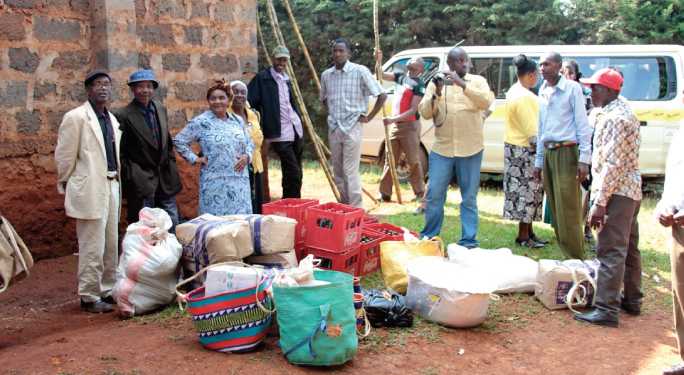I have keenly read your article published on citinewsroom.com and I have come through with the following criticisms that could give you the chance to review your understanding and knowledge about the concept you wrote about.
First of all, I would like to salute you for your effort in writing on the concept of polygamy considering gender injustice in traditional Africa.
In linking polygamy with gender justice in the traditional African society limiting it to dowry payment and economic disempowerment of women could not be held as a good correlation variable in concluding on gender injustice. First of all women in the core African society are not ‘goods of economic value’ or disempowered beings. Many women, in the wake of civilization and globalization, are more open to empowerment and though in some places, women are held for gain, it is far better in terms of today’s enlightenment.
Again, women in core African society are entitled to the inheritance of their fathers, it is not solely given to the men as your article portrays. There are instances where the dead father has to pass his inheritance to his sister’s son with the instruction for taking care of all his children. So it is not entirely true if you emphatically say that traditional African families pass their fixed properties to the men while leaving women with no inheritance.
Besides, women cannot only depend on inheritance to gain economic empowerment or freedom. For instance, in northern Ghana, women are very hardworking and own barns of yam and small-holding farms that make them economically viable.
Asking suitors to pay dowry in a form of cow, money or any other valuable item can never be classified as ‘sold as an economic good’ in return for these goodies. Your argument becomes more baseless when you make the case that families want their daughter to leave quickly for marriage because they can longer shoulder the responsibility. Traditional African culture demands that a man must demonstrate his ability to cater for the wellbeing of the woman through the payment of these items that are on demand before the marriage.
There are instances where families had handed over their daughter to a man without taking anything in return when there is a close family tie or good family union. Instances, where these economic good items are in high demand, are when the man had travelled from far to seek the woman’s hand in marriage. That is where cow, money, drinks and merrymaking become compulsory in an attempt to bring glory to the woman and the family. Within familial cycles, dowry payment is not a contention except when the man’s family is coming from a rich home.
It is not also true that economically empowered men always attract the opposite sex. If you have closely studied the culture of Africa, you will realize that marriage was only a negotiation for the rich not the poor. Going to ask for the woman’s hand in marriage is not done on a silver platter. You don’t have to attract the woman, the woman must agree first to stay with you as husband even before all the processes could commence.
Unless you want to mix culture with contemporary happenings. In any case, families look for hardworking men to come forward to ask for their daughter’s hand in marriage. Sometimes, if your background is rich, the family might refuse you the opportunity from marrying their daughter because they fear rich people might be tempted to marry more women when the need be. Even with this arrangement, the woman still has to agree.
A woman putting up for polygamy cannot be classified as gender injustice with the background that you sought to address. You want to say that the economically empowered men bully women with their riches by inviting another woman even if she is not in agreement.
The polygamy arrangement in our traditional society comes at the back of several factors: the wife not being able to conceive, disrespect towards the husband and support for farmlands or businesses. It is not quite true that because a man has money then he will necessarily invite an additional wife at the expense of the first. Men who are economically empowered would like to sneak around with concubines and traditionally, culture accepts concubines and women also understand.
Your argument against polygamy using biblical quotation defeat, sincerely, academic scholarly knowledge. Marriage does not make women inferior, it makes them properly assume their position in life as ‘servants’ to men not necessarily meant to be abused or trodden upon. Biblical quotations from the old testament saw God give a commandment about polygamous marriage inheritance, and if the old testament could be considered as God’s message, that arrangement still stands today (Deuteronomy 21:15, I Samuel 1:1-2).
I do not want to believe that it is polygamy that makes women suffer gender injustice. Better still, the biblical concept has not given us any reference to women being entitled to many husbands. In reality, it is a man who commits adultery, not a woman. Because the man with all the economic capacity can marry additional wives with their consent and that of their family.
Making an argument for gender injustice using polygamy can be very misleading. Asking for the abolishment of certain inheritance systems, payment of dowry and doing away with polygamy as a solution for justice and equity for women to be properly empowered fall short of the whole truth and cannot be consistent with facts on the ground. Gender injustice is rooted in patriarchal settings of our culture that gives men ultimate control over women. Domestic violence in marriage has been proven to be a result of patriarchy where some immature men take advantage of their wives and abuse them unnecessarily.
Addressing gender injustice is addressing the issue of domestic violence which remains a silent killer of many women in relationships. I thought you were going to make a case for divorce as the only means for a woman to seek true justice from an economic abusive husband.
The problem you have identified is a good one but the dimension in which you wanted to address it is a bit problematic in terms of the true reflection of some of the conclusions that you have made.
The writer is Isaac Ofori, Isaacofori449@gmail.com.















